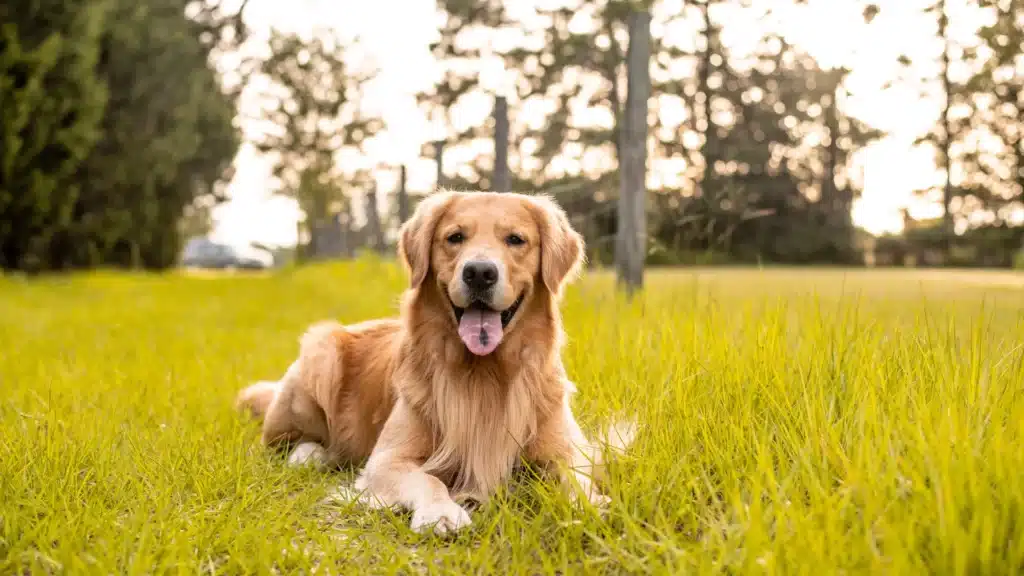Howling in Dogs: The Ultimate Guide to Canine Communication
Dogs have an incredible way of communicating with us and with each other. While their wagging tails, expressive eyes, and playful jumps tell us a lot about how they feel, vocalizations play an equally important role in how they express themselves. Barking, whining, growling, and howling is how dogs relay their emotions, needs, and even warnings.
Howling is such a fascinating vocalization! It can be a beautiful and mysterious sound that fills the air. But have you ever wondered why dogs howl? Is it because they’re feeling lonely, excited, or maybe they’re reacting to something we just can’t quite grasp?

Why Do Dogs Howl? Understanding the Instincts Behind This Ancient Behavior
If you’ve ever heard your dog let out a long, soulful howl, you may have wondered: why do they do that? Unlike barking or whining, howling feels more mysterious—almost like a message from deep within their instincts. Whether it happens in response to a siren, when they’re left alone, or seemingly for no reason at all, howling is a natural and meaningful part of canine communication.
Dogs howl for many reasons, from expressing emotions to responding to sounds in their environment. To truly understand this behaviour, we need to look at its evolutionary roots and the different situations that can trigger it.
- The Evolutionary Roots of Howling
- A Connection to Their Wolf Ancestors: To understand why dogs howl, we have to go back in time—long before dogs became our loyal companions. Their ancestors, wolves, relied on howling as a key part of survival. While our domesticated dogs may not roam the wild anymore, they still carry many of the same instincts.
- How Wolves Use Howling: Howling is used as a form of long-distance communication in a wolf pack. Since wolves often travel far apart while hunting, howling helps them stay connected. A wolf’s howl can be heard over several miles, allowing pack members to find each other if they get separated. Howling also serves as a warning system. Wolves will howl to announce their presence and protect their territory from outsiders. Suppose another wolf—or even a different predator—comes too close. In that case, a chorus of howls can send a clear message: “This area is taken. Stay away.”
- Why Do Domestic Dogs Still Howl: Even though domesticated dogs no longer need to communicate over vast distances, their instincts remain. Many reasons dogs howl today can be traced back to these ancestral survival tactics. Whether they’re letting you know they’re lonely, responding to a distant sound, or trying to get your attention, your dog’s howl is their way of “speaking” in a language that has existed for thousands of years.
- Common Reasons Dogs Howl: While howling may be instinctive, different dogs howl for different reasons. Understanding these triggers may help you understand your dog’s howling.
- Territorial Communication
- Some dogs howl to alert others of their presence. If your dog hears an unfamiliar noise outside, such as a stranger walking by, another dog barking, or even a car door slamming, they might howl to say:
“I hear you, and this is MY home!”
This howling type is more common in guard dog breeds and those with strong protective instincts. - Separation Anxiety: One of the most heartbreaking reasons dogs howl is separation anxiety. If your dog howls whenever you leave the house, they may feel stressed, lonely, or insecure without you. Dogs with separation anxiety often display other signs, such as:
- Pacing or circling near the door
- Destructive behaviour (chewing furniture, scratching doors)
- Excessive barking or whining
- Accidents in the house, even if they’re potty trained
- If your dog howls when left alone, it’s calling for you because it feels distressed.
- Some dogs howl to alert others of their presence. If your dog hears an unfamiliar noise outside, such as a stranger walking by, another dog barking, or even a car door slamming, they might howl to say:
- Response to Sounds:
Have you ever noticed your dog howling at a siren, musical instrument, or another dog? This is a completely natural reaction! Some common sounds that trigger dog howling include:- Music (especially wind instruments like harmonicas or flutes)
- Sirens from ambulances, fire trucks, or police cars
- Other dogs howling, either in the neighbourhood or on TV
- Dogs react to these sounds because they mimic the high-pitched frequencies of a howl. It’s their way of saying, “I hear you, and I’m joining in!” This behaviour is usually harmless, but if your dog seems distressed by certain sounds, you can help by creating a calm environment with background noise or comforting them when needed.
- Attention-Seeking:
Some dogs figure out pretty quickly that howling gets them attention—even if it’s not always positive! If your dog howls and you immediately react by talking to it, petting it, or giving it treats, it may start howling to get a reaction from you. It’s like a little kid throwing a tantrum to get noticed! To discourage attention-seeking howling, try:- Ignoring the howling (if it’s not urgent)
- Rewarding quiet behaviour instead
- Try to make sure that your dog receives enough exercise and mental stimulation.
- If your dog howls simply because they’re bored, more playtime and interactive toys can make a big difference.
- Medical or Pain-Related Howling:
If your dog starts howling more than usual, it could be a sign that they’re in pain or discomfort. Dogs don’t always show pain in obvious ways, so howling might be their way of telling you something’s wrong. Some potential medical reasons for howling include:- Injuries or joint pain (especially in older dogs)
- Ear infections (which can make sounds seem louder or painful)
- Cognitive issues (older dogs with dementia may howl due to confusion)
- If your dog’s howling is accompanied by whimpering, limping, loss of appetite, or unusual behaviour. A vet check-up is a good idea to rule out health concerns.
- Hunting and Prey Drive:
Certain dogs, like hounds and hunting breeds, have a strong instinct to howl when they track a scent. This is called “bay howling,” and it helps hunters locate their dogs in the field. Some of the most vocal hunting breeds include:- Beagles
- Bloodhounds
- Basset Hounds
- Coonhounds
- Response to Sounds:
Even if your dog isn’t used for hunting, they may still howl if they catch an interesting scent in the yard—it’s in their nature!
Howling in Different Dog Breeds: Why Some Dogs Howl More Than Others
While all dogs are capable of howling, some do it much more frequently than others. If you have ever heard a Siberian Husky “talking” to their owner or a beagle howling during a scent trail. Then you know exactly what I am talking about!
On the other hand, some dogs rarely, if ever, let out a howl. Instead, they may prefer barking, whining, or staying relatively quiet. But why does this difference exist?
Breeds That Howl More Frequently
While any dog can howl, some breeds are born to be more vocal. These dogs have strong instincts for hunting, working, or communicating with their pack.
Why Do Some Breeds Howl More?
Certain breeds howl more often due to the following:
- Genetic history – Many howling breeds have ancestors that relied on vocalization for hunting or teamwork.
- Pack mentality – Some dogs, like Huskies, descend from pack-oriented breeds that use howling to communicate.
- Scent tracking – Hound dogs often howl to alert their handlers when they’ve found a scent trail.
Now, let’s look at some of the most notorious howlers and what makes them so vocal.

Siberian Huskies
If you’ve ever watched a Siberian Husky in action, you know they’re one of the most talkative dog breeds out there. Unlike many dogs that bark, Huskies prefer to communicate through howling, whining, and “talking.”
- They come from wolf-like ancestors that lived in large packs.
- As sled dogs, they used howling to communicate over long distances.
- They’re highly expressive and use their voices to engage with their owners.
- Huskies are known for their playful and dramatic personalities, and their howling often sounds like a full-blown conversation! If you own one, expect plenty of “talkative” moments.
Beagles
Beagles may be small, but their voices are powerful and unmistakable. These little hound dogs were bred to hunt rabbits, and their howling serves an important purpose.
- They use howling to alert their handler when they’ve found a scent.
- They have strong hunting instincts that make them naturally vocal.
- They get excited easily, and howling is their way of expressing it!
Beagles have a distinctive “bay” howl, a mix between a howl and a bark. This unique sound helps hunters locate them in dense forests. Even pet Beagles at home often howl when they get excited or hear a loud noise.


Bloodhounds
Bloodhounds are famous for their sense of smell, which makes them one of the best tracking dogs in the world. Their deep howl carries over long distances, helping their handlers follow them while they track a scent.
- Their ancestors used howling as a signal during tracking.
- Their long, deep vocalizations help communicate with handlers.
- They have strong working instincts and enjoy following trails.
- A Bloodhound’s howl is low-pitched and mournful, but it’s one of the most recognizable sounds among dog breeds.
Alaskan Malamutes
Alaskan Malamutes are close relatives of Huskies and share many of the same vocal habits. They are large, strong pack dogs that originally worked as sled pullers.
- They are highly social and use howling to “talk” to their pack.
- They have a natural instinct to respond to high-pitched noises.
- They enjoy howling as part of their expressive nature.
- While they don’t “talk” as much as Huskies, Malamutes are known for their deep, wolf-like howls, which can be hauntingly beautiful.

Other Frequent Howlers:
- Coonhounds – Bred for hunting, these dogs have a signature “bay” that helps alert their handlers.
- Dachshunds – Despite their small size, some have strong hunting instincts and will howl when excited.
- American Eskimo Dogs – These fluffy white dogs are surprisingly vocal and enjoy howling when excited or left alone.
You’ve probably heard your fair share of howling if you own any of these breeds!
Breeds That Rarely Howl
While some dogs love to howl, others barely make a peep. Instead of howling, these breeds may prefer to bark, whine, or stay quiet altogether.
- Less need for long-distance communication – Some breeds were developed as companion dogs and don’t need to “call out” to a pack.
- Stronger barking instincts – Like guard dogs, certain breeds rely more on barking than howling.
- Natural quiet temperament – Some dogs are more laid-back and don’t feel the urge to vocalize as much.

Golden Retrievers
Golden Retrievers are sweet and friendly, but they are not big howlers. Instead, they communicate through barking and body language.
- They were bred as retrievers, not hunters that needed to howl.
- They rely on facial expressions and tail wagging rather than vocalizations.
- They tend to bark when excited but rarely let out a long howl.
- Goldens may howl occasionally, but it’s not their primary communication method.
Labrador Retrievers
Labradors, like Goldens, are more likely to bark than howl. These intelligent dogs were bred for retrieving, not for tracking prey, so howling was never necessary for them.
- They express themselves through barking, wagging, and playful behaviours.
- They don’t have the same pack-communication instincts as Huskies or Beagles.
- They are naturally social and don’t need to “call out” to others from far away.

Other Rarely Howlers
Some smaller companion breeds, such as Poodles, French Bulldogs, and Cavalier King Charles Spaniels, are naturally quiet. These dogs were bred primarily as companions, so howling was never part of their genetic makeup.
- They prefer staying close to their owners and don’t need to “call out.”
- They rely more on barking or body language to communicate.
- They have calm, relaxed temperaments that make them less vocal.
The Emotional and Behavioral Meaning Behind Howling: Understanding Your Dog's Vocal Expressio
If your dog has ever howled in response to you, joined in when they heard another dog, or let out a long, mournful howl when left alone, you might have wondered: what does it really mean?
- Dogs Use Howling to Communicate
In the wild, wolves howl to stay connected with their pack, and domestic dogs have inherited this same instinct. While modern dogs don’t need to howl to find their way home, they still use it to engage with their family members, whether human or canine.
Have you ever noticed your dog howls when you come home or play with them? That’s because howling can be a sign of excitement and bonding. - Howling Back at Their Owners
Many dog owners have discovered that their dogs will enthusiastically join the chorus if they start howling!
Dogs that howl in response to their owners engage in playful communication, showing that they are paying attention and want to interact. - Howling Together with Other Dogs
One dog’s howl can trigger the others to join in if you have multiple dogs. This is known as contagious howling, a natural pack behaviour.
Some breeds, like Huskies and Beagles, will howl together to reinforce their group identity.
Even if they aren’t part of a “pack,” dogs often howl in response to distant noises, like sirens or other dogs barking in the neighborhood.
Some dogs even howl when they hear singing or music as if trying to join the performance!
If your dog howls with you or their canine friends, it’s a sign of social bonding and connection. It’s their way of saying, “I hear you! I’m here too!” - Howling and Separation Anxiety
Some dogs howl when left alone because they feel stressed, insecure, or abandoned. This is especially common in dogs that are very attached to their owners. Signs that your dog’s howling is due to separation anxiety:- The howling starts soon after you leave the house.
- It’s combined with other anxiety behaviours, like pacing, destructive chewing, or urinating inside the house.
- The howling is constant and doesn’t stop until you return.
Dogs with separation anxiety aren’t just being dramatic and they are genuinely struggling with the fear of being left alone.
- Howling vs. Whining: What’s the Difference?
Sometimes, it can be hard to tell if your dog is howling out of loneliness or whining for attention. While both are ways for dogs to communicate distress, they have slightly different meanings:- Howling – A long, drawn-out sound that carries over a distance. This usually means they feel alone or are trying to reach out to someone.
- Whining – A higher-pitched, repetitive sound that sounds more like a complaint. Dogs whine when seeking attention, feeling uncomfortable, or unsure about something
- Howling as a Symptom of Distress
If your dog is howling more than usual, it could be due to:- Pain or injury – If your dog suddenly starts howling and seems uncomfortable, they may be in pain.
Hearing loss – Older dogs that start howling more frequently may lose their hearing, making them feel disoriented. - Cognitive dysfunction – Senior dogs with dementia or confusion may howl out of frustration or distress.
If your dog’s howling seems unusual, it’s always a good idea to monitor their behaviour and consult a veterinarian.
- Pain or injury – If your dog suddenly starts howling and seems uncomfortable, they may be in pain.
- Cognitive Dysfunction in Senior Dogs
Older dogs may start howling more due to canine cognitive dysfunction syndrome (CCDS), similar to dementia in humans. Signs of cognitive dysfunction in dogs:- Disorientation (getting lost in familiar places)
- Increased nighttime restlessness and howling
- Forgetting previously learned commands or routines
If your senior dog howls at night or appears confused, talk to your vet about ways to support their cognitive health, such as brain-stimulating activities, dietary changes, or medications.
- Dogs Use Howling to Communicate
Myths and Misconceptions About Howling
Dogs Howl at the Moon
One of the most famous myths about howling is that dogs howl at the moon. We’ve all seen the classic image of a lone wolf or dog, silhouetted against a full moon, letting out a long, eerie howl. But is this really what’s happening?
- The Reality: Dogs Howl for Communication, Not the Moon
The idea that dogs howl at the moon is purely a myth. While it’s true that dogs (and their wolf ancestors) are more likely to howl at night, the moon itself has nothing to do with it. - The world is quieter – Dogs can hear distant sounds more clearly without daytime noises and may howl in response.
- More nocturnal activity – Many wild animals, including wolves, are active at night, so their howls may trigger a response from dogs.
- Pack communication instincts – Dogs instinctively howl to signal their location or to respond to other howls, whether from fellow canines or distant sounds like sirens.
- Wolves and dogs tilt their heads up when they howl, not because they are looking at the moon, but because it helps project their sound farther!
So, while a dog’s howl might seem directed at the moon, it is actually responding to sounds, expressing emotions, or trying to communicate—just like it would during the day.
- The Reality: Dogs Howl for Communication, Not the Moon
Howling is a Sign of Bad Luck
In many cultures, a howling dog is considered an omen of bad luck. Some believe that a dog howling near a house brings misfortune or warns of something terrible about to happen.
- The Reality: Howling Has No Connection to Luck
There is no scientific evidence that a howling dog is connected to luck—good or bad. This myth likely started because people associated howling with wolves and the wild, seeing it as a mysterious or unsettling sound. - Dogs are thought to ward off evil spirits by barking or howling.
- In Japanese folklore, dogs are seen as symbols of protection and loyalty.
- Some Native American tribes believe that a dog’s howl can warn of natural disasters, not as a bad omen, but as an early alert to danger.
So, rather than seeing howling as a bad omen, we can appreciate it as part of a dog’s natural way of communicating and expressing emotions.
- The Reality: Howling Has No Connection to Luck
A Howling Dog Signals Impending Death
One of the oldest myths is that a howling dog means someone is going to die. This belief has been passed down through generations in different cultures around the world.
- The Reality: Superstition, Not Science
- In some European folklore, a dog howling outside a home was believed to be a sign that death would soon visit the household.
- In Irish mythology, the Banshee, a ghostly woman known for her mournful wail, was sometimes associated with dogs howling before a person’s passing.
- In parts of Asia and Africa, people believed that a dog’s howl meant they could see spirits or ghosts that humans could not.
Dogs Howl Near Sick or Elderly People?
In rare cases, dogs seem to sense when someone is unwell, which may have contributed to this myth. But instead of predicting death, this could be because:
- Dogs have an incredible sense of smell – Some dogs can detect changes in human body chemistry, even sniffing out illnesses like cancer.
- Dogs are highly sensitive to human emotions – If someone is sick or upset, a dog may howl to show concern or stress.
- A dog’s howling gets attention – Historically, if a dog howled near a sick person, it might have been trying to get someone’s attention to help them.
While dogs are incredibly intuitive, they do not have supernatural abilities to predict death. Their howling is just one of the many ways they respond to their environment and express their emotions.
A dog’s howl is more than just a sound—it’s a glimpse into their world, a way they connect with us, express emotions, and respond to their instincts. Whether your pup howls to greet you, reacts to distant sirens, or sings along with you, their voice is an important part of who they are.
We’ve explored the many reasons dogs howl, from their deep-rooted wolf ancestry to their need for communication, bonding, and emotional expression. While some howls are playful and social, others may signal loneliness, anxiety, or even a medical issue.
Instead of seeing howling as just noise, we can view it as a valuable form of expression—one that tells us something about our dog’s thoughts and feelings. By paying attention to when and why our dogs howl, we become more in tune with their needs and can respond with love and understanding.
